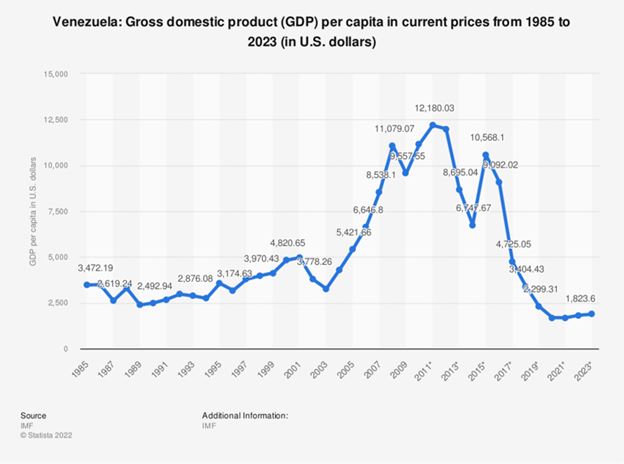Since 2019, it has been discussed so frequently on the news, televisions, and political salons how is the Lebanese crisis, which was displayed in considerable inflation rates, similar to the Venezuelan crisis. However, this is true to a certain extent since both countries suffer from high inflation rates, but on the other hand, both economies are completely different, and the roots of the crises are different as well.
In 1999, in Venezuela, Hugo Chavez was the president elected. Chavez was the beloved president in Venezuela. He decreased poverty and unemployment by half, improved education, and increased the national GDP. In 2004, the prices of oil were booming, thus, the Venezuelan economy booming too, with credit taken by Chavez indeed! Chavez was the savior of Venezuela in the perspectives of its people.
However, in reality Chavez achievements were not sustainable at all, and many economists burden him all the responsibility of what happened. Chavez created a new economy which is totally dependent on oil prices. For his luck and fortune, during his presidency (1999-2013), oil prices were convenient to appear as a savior. After his presidency ended, a new president, Maduro, was elected, and due to the world economy fluctuation at that period, oil prices fell down in 2014. After peaking at $107.95 a barrel on June 20, 2014, petroleum prices plunged to $44.08 a barrel by January 28, 2015, a drop of 59.2 percent in a little over 7 months. Thanks to Chavez, the Venezuelan economy is now correlated to the oil market, and with failure of Maduro to adjust , hyperinflation occurred, and the crisis of the Venezuelan economy starts now!
Due to hyperinflation, products and services that were nearly free at Chavez’s presidency, became un-accessible by more than 82% of the population. Products like food and medication are considered now luxurious products in Venezuela.
In a trial to fix the situation, Maduro fixed the $ rate for 1$=10Bolivars, but this rate was not accessible for anyone who was not in his military backbone, or of his allies. The real exchange rate was the black market one, 1$=12000Bolivars. The black-market rate represented 1200% of Maduro’s rate. Moreover, Maduro has given the military a privilege to import food supply of the country on his rate, and due to the corruption that Maduro created to keep him in power, the military forces sold those supplies at the black-market rates, making a fortune! Maduro’s allies and military cabinet made massive profits, which have set very good relations with Maduro, thus, keeping Maduro in power. A study in 2016, shows that more than 80% of the citizens demand Maduro out of the office of presidency, thus, the series of protests starts in Venezuela.
In 2015, after 2 years of the election of Maduro, the opposition, MUD, took 2/3 of the national assembly, which lead Maduro to pressure the supreme court to make several orders thus filling the national assembly with Maduro’s allies. After many protests, Maduro had to act with little democracy and some respect for law, he created a new assembly in 2017 ,National constituent assembly, which consists of one wing only, thus people cannot vote for any party other than Maduro’s allies. The elections took place and Maduro announced his self a president again. The Venezuelan government stated that more than 7M citizen voted, while others estimate that not more than 3M voted. Many revolutions initiated and spread around the country, but Maduro’s military allies hit with his fist of steel. More than 100 protesters died in one day stating that Maduro’s government doesn’t have any problem to create massacres to maintain there authorities.
However, this crisis is not similar at all to Lebanon economic crisis, since:
• Lebanese economy is a rentier one(no production) unlike the Venezuelan one, then Venezuela was able to receive foreign currencies by selling goods and services to the rest of the world, but this decreased thoroughly due to sanctions initiated by the United Nations and the United States as well, adding to it the decrease of oil prices, the overall revenue decreased by 60% approximately thus, the rate of bolivar printing was so speedy ,leaving the Venezuelan currency roughly worthless. On the other hand, the Lebanese economy does not suffer from any sanctions, but it did get affected somehow by the fluctuation of oil prices. So we can see that the money supply in BDL was 20000 billion dollars in 2007, and it increased to reach 30000 billion dollars in 2009, after an increase in oil prices in this interval of time. However, this happened due to banking services that are performed by the Lebanese sectors but not a productive one or a sustainable one, or a sector that can hold by own an entire economy without having strict regulations. The entire money supply in Lebanon was found by debt, and that is why we saw a prospering economy in the 90s after Paris 1 conference, by which the Lebanese government borrowed more than 10 billion dollars, and then increasing this debt so much. However, after 2010, Lebanon did not find any side willing to borrow him more money so it sold bonds to local banks in hope that they pay them back by borrowing from the IMF , this is what is called a Ponzi scheme!
• The political stance in Venezuela has a right wing and a left wing, unlike the Lebanese political reality which does not have a clear wing

